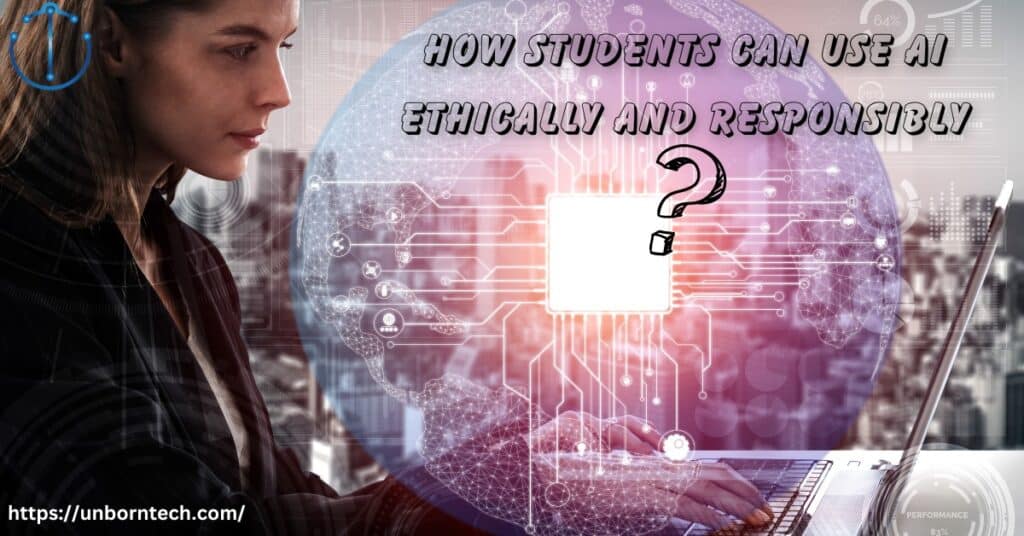Did you know that nearly two-thirds of surveyed students (63.4 percent) have utilized AI-based tools for their studies?
However, a majority (54 percent) consider using AI for schoolwork or exams as cheating or plagiarism, with 21 percent disagreeing and approximately 25 percent remaining neutral on the matter.
In today’s digital age, students are increasingly turning to artificial intelligence tools to aid them in various aspects of their academic journey. From essay-writing bots to plagiarism checkers, AI has become an integral part of the modern student’s toolkit.
However,
With Great Power Comes Great Responsibility.
Students must understand how to use AI ethically and responsibly to ensure they’re not only achieving academic success but also upholding integrity and ethical standards.
In this blog post, we’ll explore some key principles and practical tips on how students can use AI ethically and responsibly.
Table of Contents
Understanding Ethical AI
Before delving into how students can use AI ethically, it’s essential to understand what ethical AI entails.
Ethical AI involves designing, developing, and deploying AI systems that align with moral principles, respect human rights, and prioritize fairness, accountability, and transparency.
Ethical AI promotes the well-being of individuals and communities while minimizing harm and bias.
The Importance of Ethical AI in Education
Ethical AI usage is particularly crucial in the educational context. Academic integrity lies at the heart of education, and AI tools should complement, not compromise the values of honesty, diligence, and critical thinking.
Moreover, using AI ethically fosters a culture of respect for intellectual property rights, promotes originality, and cultivates responsible digital citizenship among students.
Understand What Is Considered Cheating
In the AI era, it’s crucial for students to understand what constitutes cheating and what does not.
While using AI tools to assist with research or generate ideas is acceptable, relying solely on AI-generated content without proper attribution or understanding is considered academic dishonesty.
For instance, using prompts from AI models like ChatGPT for brainstorming or inspiration is acceptable, but submitting AI-generated content without adding your own analysis or insights is unethical.
Always ensure that your use of AI tools aligns with academic integrity standards and guidelines.
8 Ways Students Can Use AI Ethically And Responsibly
Here are the 8 ways students can use AI ethically and responsibly to optimize their learning potential and foster a positive impact on society.
1. Verify the Source and Credibility of AI Tools
Before incorporating any AI tool into your academic workflow, take the time to research its developer, credibility, and track record. Choose reputable tools that prioritize ethical considerations and data privacy.
For example, tools developed by established academic institutions or companies with a strong reputation for ethical practices, such as Turnitin for plagiarism detection, can be trusted.
2. Understand the Limitations and Biases of AI Algorithms
AI algorithms are not foolproof and can reflect biases present in the data used to train them. Be aware of the limitations and potential biases of AI tools you use.
For instance, facial recognition software has been criticized for its biases against certain demographics.
Exercise critical thinking skills and cross-reference information obtained from AI tools with other reliable sources to mitigate bias.
3. Respect Intellectual Property Rights and Attribution
When using AI tools for tasks such as writing, paraphrasing, or generating content, ensure that you respect intellectual property rights and provide proper attribution to original sources.
Avoid plagiarism and uphold academic honesty by acknowledging the contributions of others.
For example, when conducting research and utilizing AI-powered databases like JSTOR or Google Scholar, it’s essential to cite the sources of information accurately and ethically in your work.

4. Safeguard Personal Data and Privacy
Be cautious when providing personal data or allowing access to your digital footprint when using AI tools. Prioritize tools that prioritize data security and privacy protection.
For instance, encrypted communication platforms like ProtonMail can help protect your email privacy, while password managers like LastPass can securely store your login credentials.
Familiarize yourself with relevant privacy policies and settings to control the use of your data.
5. Question and Challenge AI Algorithms
Question the assumptions and biases underlying AI algorithms and challenge the status quo.
For example, if you encounter an AI tool that produces biased or unfair results, raise awareness of the issue and advocate for improvements or alternative solutions.
By questioning and challenging AI algorithms, students can help identify and address ethical concerns and promote the development of more equitable AI technologies.
6. Engage in Continuous Learning and Ethical Reflection
Stay informed about developments in AI ethics and responsible use practices. Engage in discussions and workshops on AI ethics within your academic community.
Reflect on the ethical implications of AI usage in your studies and consider how you can contribute to creating a more ethical AI landscape.
By fostering a culture of ethical awareness and accountability, students can collectively shape a more responsible use of AI in education and beyond.

7. Advocate for Ethical AI Policies
Advocate for the implementation of ethical AI policies within your educational institution.
For example, encourage your school to adopt guidelines for the ethical use of AI in academic settings and to provide training and resources on AI ethics for students and faculty.
By advocating for ethical AI policies, students can help ensure that AI technologies are used responsibly and in line with ethical principles.
8. Collaborate Ethically with AI Systems
When collaborating with AI systems or integrating AI technologies into group projects, ensure that all team members understand and agree on ethical guidelines for AI usage.
Foster open communication and transparency regarding the ethical implications of AI decisions and actions.
For example, establish clear guidelines for data sharing and consent when using AI-driven collaboration tools like Google Docs or Microsoft Teams.
Conclusion
As students harness the power of AI to enhance their academic endeavors, it’s paramount that they do so ethically and responsibly.
By adhering to principles of integrity, critical thinking, and respect for others’ rights, students can leverage AI as a valuable tool while upholding the ethical standards that underpin education.
By embracing ethical AI practices, students not only fulfill their academic responsibilities but also contribute to a more equitable and sustainable digital future.
Frequently Asked Questions (FAQs)
Is using AI tools considered cheating in academia?
It depends on the context and how the AI tools are used. While some students believe that utilizing AI for schoolwork or exams constitutes cheating or plagiarism, others argue that it can be a legitimate aid if used responsibly and ethically.
How do students use AI ethically?
Students can use AI ethically by verifying the credibility of AI tools, understanding their limitations and biases, respecting intellectual property rights, safeguarding personal data and privacy, and engaging in continuous learning and ethical reflection.
Are there any resources available for students to learn more about AI ethics?
Yes, students can explore workshops, online courses, academic publications, and blogs like UnbornTech.
Subscribing to UnbornTech’s newsletter provides regular updates on AI ethics, fostering continuous learning and ethical reflection.
What are the benefits and ethical issues of using AI in school?
The benefits of using AI in schools include enhancing learning experiences, personalizing education, improving efficiency in administrative tasks, and fostering innovation.
However, ethical issues may arise concerning privacy, data security, bias in algorithms, academic integrity, and the digital divide among students. It’s essential to address these ethical concerns while leveraging the benefits of AI in education.






